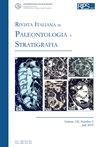LOWER PALEOCENE DEEP-WATER AGGLUTINATED FORAMINIFERA FROM THE CONTESSA HIGHWAY SECTION (UMBRIA-MARCHE BASIN, ITALY): TAXONOMY, STRATIGRAPHIC DISTRIBUTION AND ASSEMBLAGE TURNOVER ACROSS THE CRETACEOUS/PALEOGENE BOUNDARY
IF 1.9
3区 地球科学
Q2 GEOLOGY
引用次数: 0
Abstract
Deep-water agglutinated foraminifera (DWAF) are investigated from the lower Paleocene of the Contessa Highway Paleocene (CHP) section in the Umbria-Marche Basin in Italy. In the lowermost part of the Paleocene corresponding to the P0–Pα interval and lowermost P1 planktonic foraminifera zones, a total of 46 species of DWAF are identified. A comparison with the uppermost Maastrichtian DWAF assemblages documented by Cetean (2009) results in a combined total of 94 DWAF species over the Cretaceous/Paleogene boundary interval at Contessa Highway. Of these, 49 species are listed as extinction taxa, nine are survivor taxa, 19 are Lazarus taxa, and 17 taxa display first occurrences in the Paleocene. The record of DWAF in the Contessa Highway Paleocene section displays a moderate decrease in diversity across the K/Pg boundary, followed by a gradual recovery in the first meter of the Paleocene. The lower Paleocene record is characterized by blooms of opportunistic species belonging to the genera Reophax, Subreophax, Repmanina, and Spiroplectinella. The K/Pg boundary interval records a major change in the proportions of DWAF morphogroups, from a suspension-feeding community in the Maastrichtian to one dominated by epifaunal detritivores in the lower Paleocene, reflecting a fundamental change in marine primary productivity following the bolide impact.意大利UMBRIA-MARCHE盆地孔特萨公路段古新世深水凝集有孔虫:白垩纪/古近纪边界的分类学、地层分布和组合翻转
对意大利翁布里亚-马尔凯盆地Contessa公路古新世段古新世下段的深水凝集有孔虫(DWAF)进行了研究。在对应P0–Pα区间的古新世最下部和最下部P1浮游有孔虫带,共鉴定出46种DWAF。与Cetean(2009)记录的马斯特里赫特阶最上层DWAF组合相比,在Contessa高速公路的白垩纪/古近纪边界区间,总共有94种DWAF物种。其中,49个物种被列为灭绝分类群,9个为幸存分类群,19个为拉撒路分类群,17个分类群首次出现在古新世。Contessa公路古新世段的DWAF记录显示,K/Pg边界的多样性适度下降,随后在古新世的第一米逐渐恢复。古新世下记录的特征是属于Reophax属、Subreophax、Repmanina属和Spiroplectinella属的机会物种大量繁殖。K/Pg边界层段记录了DWAF形态群比例的重大变化,从马斯特里赫特阶的悬浮觅食群落到古新世晚期以表生碎屑动物为主的群落,反映了在玻利维亚影响后海洋初级生产力的根本变化。
本文章由计算机程序翻译,如有差异,请以英文原文为准。
求助全文
约1分钟内获得全文
求助全文
来源期刊
CiteScore
3.60
自引率
4.30%
发文量
28
审稿时长
>12 weeks
期刊介绍:
The Rivista Italiana di Paleontologia e Stratigrafia was founded in 1895. It publishes original papers dealing with all fields of paleontology and of stratigraphy, from Italy and the Mediterranean to the Tethys, as well across the globe from China to North America.

 求助内容:
求助内容: 应助结果提醒方式:
应助结果提醒方式:


